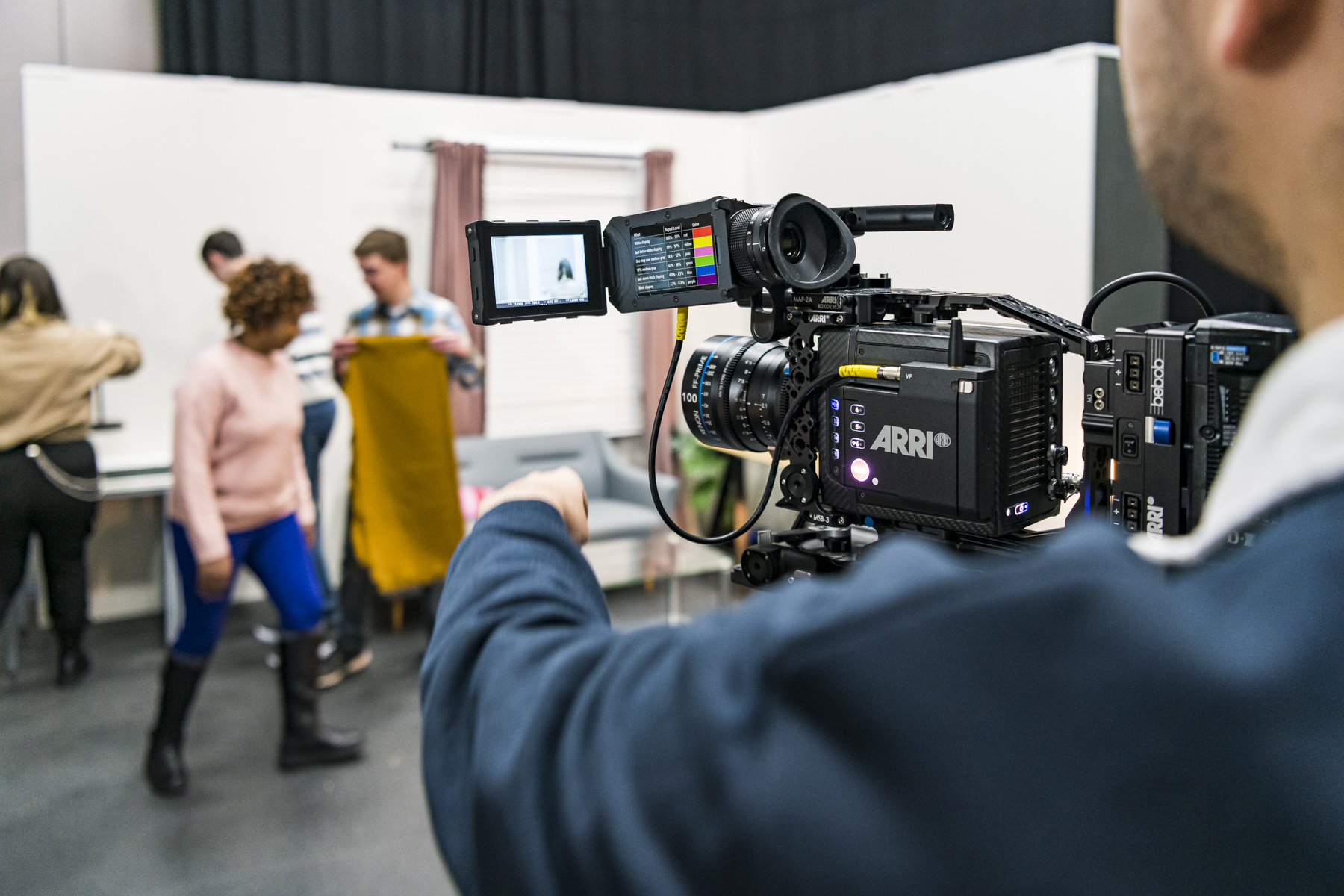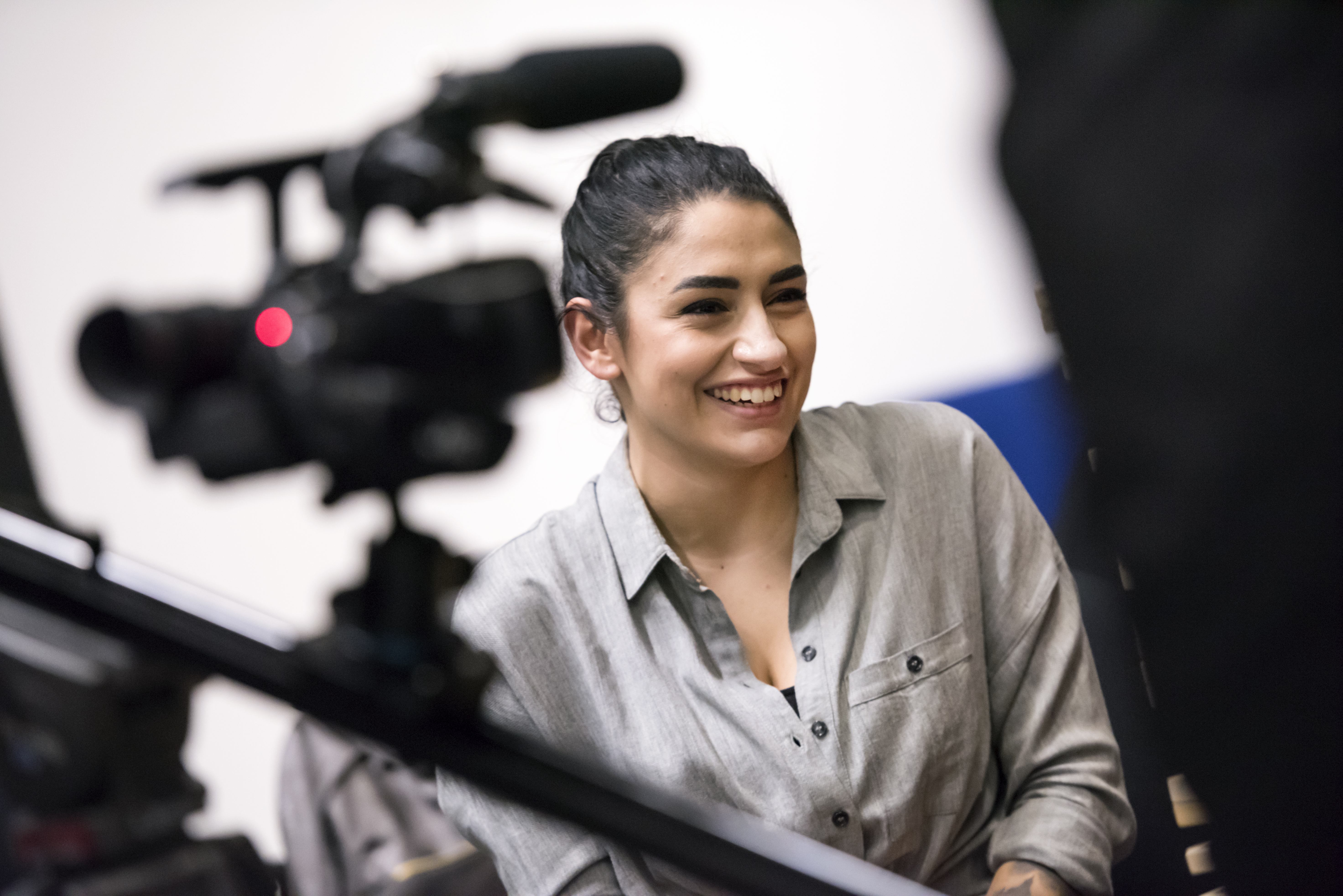Filmmaking Taster Sessions
Any combination of Digital Film Production sessions listed below can be provided by the Film Team. Running times are variable (except where noted) and most can be adjusted to suit individual requirements. We may be able to offer bespoke taster sessions other than those listed here – please feel free to contact us with your requirements: film@uos.ac.uk
Filmmaking Sessions
The Power of Storytelling through (Fiction) Film
Dive into the heart of filmmaking: storytelling. Explore classic narrative structures like the three-act format and the hero's journey. Analyse film clips to understand how visual elements convey story. Learn the art of storyboarding, translating ideas into visual sequences. Practice creating storyboards for short scenes, focusing on shot composition and visual flow. Conclude with a group discussion on effective visual storytelling techniques.
Key components:
- Narrative structures in film
- Visual storytelling analysis
- Storyboarding techniques
- Hands-on storyboard creation
- Group critique and discussion
Duration: 2 hours
Lights, Camera, Action: Introduction to Film Production
Experience the excitement of a film set. Learn about key roles including director, cinematographer, and sound recordist. Handle professional cameras, lighting equipment, and sound gear. Understand basic shot composition and lighting setups. Participate in a mock film shoot, rotating through different roles to gain hands-on experience. Conclude by reviewing footage and discussing the challenges and solutions encountered during the shoot.
Key components:
- Film set roles and responsibilities
- Equipment handling and safety
- Basic shot composition and lighting
- Mock film shoot experience
- Footage review and production discussion
Duration: 2 hours

The Magic of Film Editing
Discover how editing shapes the final film. Learn about different editing techniques like cuts, fades, and transitions. Explore the concept of pacing and its impact on storytelling. Get hands-on experience with basic editing software, learning to assemble shots, add music, and create simple effects. Edit a short sequence, experimenting with different arrangements to see how it affects the story. Conclude with a screening and discussion of everyone's edits.
Key components:
- Editing techniques and terminology
- Pacing and rhythm in editing
- Introduction to editing software
- Hands-on editing exercise
- Group screening and critique
Duration: 2 hours
The Art of Cinematography
Delve into the visual language of film. Explore various camera movements and their emotional impact. Learn about shot compositions, from wide establishing shots to intimate close-ups. Understand how lighting creates mood and atmosphere. Practice setting up different lighting scenarios, from bright day to moody night. Experiment with framing and camera angles to tell a story visually. Conclude by shooting and reviewing short scenes, discussing how cinematographic choices affect storytelling.
Key components:
- Camera movements and their effects
- Shot composition techniques
- Lighting for mood and atmosphere
- Practical cinematography exercise
- Scene shooting and group critique
Duration: 2 hours

Documentary Workshop
This workshop teaches participants how to think about time and character through the documentary medium.
Students will learn how documentary is always about storytelling, both through viewing brief examples from recent practice as well as through a series of practical exercises where participants will be thinking about the sequence of shots, editing within camera, and learning how to vary shot size and camera position.
Key skills acquired will include aspects of composition, pacing, working with or without a tripod, shooting for the edit, communication and co-ordination between sound and camera.
Sound in Cinema: More Than Just Dialogue
Explore the often-overlooked world of film sound. Learn about different types of film sound: dialogue, music, and sound effects. Understand how sound design enhances storytelling and creates atmosphere. Practice basic sound recording techniques and learn about common issues in production sound. Experience simple sound mixing, adding effects and music to a scene. Conclude by listening to and discussing how different sound designs change a scene's impact.
Key components:
- Types of film sound
- Sound recording techniques
- Basic sound mixing
- Sound design exercise
- Comparative listening and discussion
Duration: 2 hours
Foley / ADR (Additional Dialogue Recording) Workshop
This hands-on, practical session introduces students to the world of sound-for-picture and gives them the opportunity to re-record dialogue and sound effects in the Film department’s 5.1 surround audio postproduction studio.
Maximum number: 6 students per group
Duration: 90 mins – 2 hrs per group
(Can be run in rotation with other sessions for larger cohorts).
[Note: this session can only be offered on site at the university’s Ipswich campus].
Shooting for Sound Workshop
Students get to shoot a short drama film using ‘double system’: a camera, a professional external field mixer and a shotgun microphone. They will also learn how to break down and mark up a shooting script to create a shot list.
Minimum number: 6 students
Maximum number: 12 students
Duration: 2 hrs
(Can be run in rotation with other sessions for larger cohorts.)
* Short session (can be combined with other asterisked sessions)
We are also able to provide a selection of Film Studies-based taster sessions to suit your needs and curriculum. Three examples are listed below. Please contact us at film@uos.ac.uk to discuss any bespoke session requests.
Film Studies: Why Do We Love Horror?
Horror is one of the most enduringly popular and polarising film genres around. But why do audiences continue to enjoy horror so much? Is it simply morbid curiosity, or because we like particular genres and appreciate our familiarity with them? Or is it perhaps because our emotional responses to scary movies give rise to both negative and positive feelings and simulate how we’d respond to real scares? This interactive workshop gets students exploring the contexts and history of horror, its motifs and aesthetics, and some interpretations of some of the most infamous horror movie ‘monsters’.
This session can be combined with other humanities subjects and may be of interest to English, Creative Writing or Media students. It can also be tailored to a more gothic and/or televisual focus.
Film Studies: Ethics and Representation
Films are susceptible to unanticipated responses – this is one of the exciting things about cinema, that it is open to interpretation. But who gets to decide what is fair, or accurate, in terms of what a film is showing or saying? Is it the filmmaker? The audience? The industry? Or a combination of all these groups? This session addresses the representational aspect of cinema and how a film’s subject and ethics can be read through its form, genre, and aesthetics. Students will analyse and discuss filmic examples and ideas such as stereotype, lived experience, fidelity, and offense and think about how film can raise awareness of social, cultural and political issues.
*This session can be tailored to a narrative cinema, short film, or documentary focus.
Film Studies: Movies and Marketing
Film is a unique medium because it captures like in a way that isn’t found in other art forms like photography or painting – it presents people, experiences, and stories in a three dimensional and ‘life like’ way and is a combination of many other art forms (such as writing, sound, costume, makeup, design). It is also distinct because of the amount of time and money spent promoting it to audiences, particularly in Hollywood and global block buster cinema. For instance, Barbie (2023) had a marketing budget of $150 million, $5 million more than its production cost. This marketing campaign though helped it make almost $1.5 billion dollars in box office revenue. This interactive session covers the evolution of movie marketing strategies and products; it gets students exploring how they respond to marketing campaigns and considering how they and wider audiences might influence and interact with these promotional strategies in the digital era.